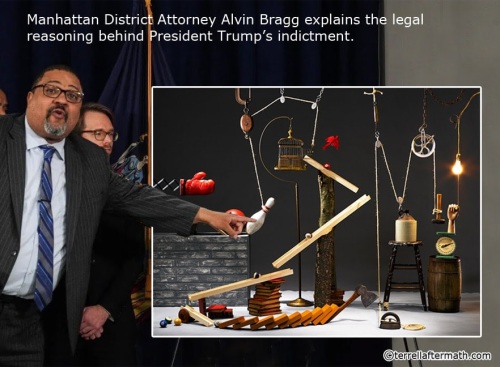
The following is by Catherine Yang at The Epoch Times:
After six weeks, former President Donald Trump’s criminal trial is nearing an end, with closing arguments set to begin May 28. Here’s what to know to catch up with the case.

Manhattan District Attorney Alvin Bragg charged Trump with 34 counts of falsifying business records in the first degree, a class E felony.
New York Business Law 175.10 states: “A person is guilty of falsifying business records in the first degree when he commits the crime of falsifying business records in the second degree, and when his intent to defraud includes an intent to commit another crime or to aid or conceal the commission thereof.”
The second crime in this case is conspiracy “to promote or prevent the election of any person to a public office by unlawful means,” say prosecutors, but Trump was not directly charged with conspiracy.

The 34 allegedly falsified records are 11 checks cut to Michael Cohen, ex-lawyer to Trump, and the corresponding vouchers and invoices. Prosecutors allege these payments, categorized as legal expenses, were reimbursement for money Cohen paid to Stephanie Clifford, better known as adult actress Stormy Daniels, as part of a scheme to influence the 2016 elections.
To prove their case, prosecutors need to show that Trump had the intent to defraud – more specifically, the intent to conceal the alleged conspiracy – when causing these records to be created. There is no proof requirement that the goal of the conspiracy was to promote the election of a person by unlawful means, or the extent of Trump’s participation. The jury will be instructed on the concept of accessorial liability, which explains that Trump did not have to commit the crimes himself in order to be criminally liable.

On the witness stand, Cohen painted the picture of urgency in mid-October 2016: representatives for Stormy Daniels were pressing him to close the deal on her story of an alleged sexual encounter with Trump, or it would go to another news outlet. Meanwhile, he claimed his boss instructed him to “delay, delay, delay,” because if they could push it past the election in just a few weeks, they wouldn’t need to pay; the story would no longer matter.
Clifford declared the contract null and void, and Cohen caved. He testified that, with Trump’s approval, he made a $130,000 payment.

Cohen also testified to being intensely angry later that year, when he discovered his bonus had been cut by two-thirds from what he typically received. It prompted discussions with former Trump Organization CFO Allen Weisselberg, who purportedly drew up plans to reimburse Cohen $130,000 for the payment to Clifford and $50,000 for an earlier payment to Red Finch he said he still hadn’t been reimbursed for. The sum was then doubled to $360,000 to account for taxes, and then Weisselberg added $60,000 to supplement Cohen’s bonus.
Prosecutors had claimed Weisselberg’s “grossing up” the figures for tax purposes was evidence he intended to conceal reimbursement as income, satisfying the elements of the crime.
Weisselberg, currently serving a five-month prison sentence for perjury in a separate case, did not testify.

Jurors were told to expect a long day when they come back from the Memorial Day long weekend.
On Tuesday, prosecutors will sum up their case by reminding jurors of what they believe is the most compelling evidence. Beyond Cohen’s and Clifford’s testimonies, most witnesses were called for to authenticate records like call logs, texts, and emails, which were then entered into evidence.
But for the defense, especially having called only two witnesses, this will be a key moment to present their own narrative.

Defense attorneys are expected to argue that nothing criminal occurred as non-disclosure agreements are legal, as is the payment of an attorney for legal services, and that influencing an election through lawful means cannot be a crime.
They will not be allowed to offer their interpretation of the statutes invoked in the prosecutors’ novel legal theory, as it is the judge’s job to instruct the jury on how to interpret the law.
But, they can be expected to try to poke as many holes they can find in the evidence prosecutors presented, arguing the district attorney failed to meet the burden of proving Trump had any intent to defraud.

These summations should take up the better part of the day, and the judge expects his instructions to last an hour.
Then it is up to the jury to deliberate. They will have as long as they need, but if the 12 jurors cannot come to a unanimous verdict, the result is a mistrial.









